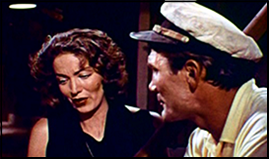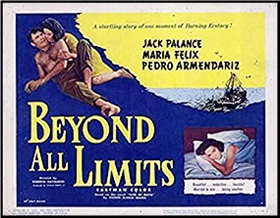Sat 30 May 2020
A Movie Review by Dan Stumpf: BEYOND ALL LIMITS (1959).
Posted by Steve under Films: Drama/Romance , Reviews[2] Comments
REVIEWED BY DAN STUMPF:
BEYOND ALL LIMITS. Cinematografica Latino Americana, Mexico, 1959. Original title: Flor de mayo. Maria Felix, Jack Palance, Pedro Armendariz, Juan Muzquiz, Carlos Montalban, and Paul Stewart. Screenplay by Libertad Blasco Ibanez, from the novel by Vicente Blasco Ibanez. Directed by Roberto Gavaldon.

Just a Soap Opera, but like all good soaps it hovers at the edge of violence like a fly at a Venus Flytrap.
Jack Palance (fittingly playing a character named Gatsby) returns to a Mexican fishing village where, six years earlier, he had an affair with the wife of a friend (Armendariz) doing a stretch in jail. To make a long flashback short: they got serious, he bailed, she had Jack’s kid and passed it off as Pedro’s.
There’s a subplot about an illegal fishing venture that moves things along, but the story proper begins when Pedro stars counting the months and wonders if his boy is really his. We’re not supposed to wonder why it never occurred to him before, so I won’t. In fact, I didn’t want to, because Beyond All Limits accomplished that most essential function of fiction: the willing suspension of disbelief.

Ibanez’ screenplay skillfully pivots between Palance, and Felix, filled with regret and longing; Armendariz, confused and compelled to reject the boy he loves as a son; and the boy (Muzquiz) convincing, not cloying, as he tries to figure out why the parents he loves seem so suddenly far away.
Gavaldon’s direction lends an operatic air to the whole thing, backed by lush music (“And That Reminds Meâ€) that would have seemed silly in hands less deft. Here it swells under the simple passions of real-seeming people, and it works. There’s one small moment in particular when a minor character pleads with Armendariz to stand by his son. “I have no child. I never had a wife. My only family is yours and you are throwing it away.†Lines so simply and wrenchingly delivered that one feels a sense of what is really at the crux of this eternal triangle.

May 30th, 2020 at 11:34 pm
Of course Vincente Blasco Ibanez was better known for his novels like THE FOUR HORSEMAN OF THE APOCALYPSE, MARE NOSTRUM, and BLOOD AND SAND. I think I know the story this was based on, but it is a lesser known work.
Interesting sounding film.
May 31st, 2020 at 4:52 am
I made an extra effort to find online Beyond All Limits in Spanish under the title Flor de Mayo. The screenplay was written by Libertad Valasco Ibáñez, daughter of original novelist and I wanted to hear the writer’s words. To appreciate a powerful actor like Pedro Armendáriz also called for the original language. An unexpected dimension was Jack Palance’s Spanish which was spoken well enough but marked with a foreign accent making him more of an interloper.
The brash North American captain Jim Gatsby, the successful local captain Pepe Gamboa, and his wife, the conflicted Magdalena were all flawed characters. Asking a viewer with which of the three characters he or she sympathized the most perhaps reveals something about the viewer’s personality, and for what it is worth I most sympathized with Pepe Gamboa. When Flor de Mayo was in theaters in 1959, couples probably left speculating how things would ultimately resolve because the ending was not “and they lived happily ever after.”
MarÃa Félix, a larger-than-life movie star, played Magdalena at times with over-the-top exaggeration and at other times more subtly with the emotional tumult of an unmoored woman. The director Roberto Gavaldón, who might have encouraged some of Félix’s more exaggerated moments, later directed a longtime favorite of mine El Gallo de Oro and the powerful Macario. The cinematographer was Gabriel Figueroa, whose name a producer might have dropped around potential financiers to let them know the prospective film was a sound investment, and the resulting photography lived up to any beforehand boast.
I am lousy at reading lips and with some scenes I wondered whether the actors were speaking Spanish or English. Some later scenes the actors’ mouths were moving before sound seemed to come out, so badly synchronized that it seemed as if post-production was rushed to save money. The version in Spanish had extended scenes, absent in the English version, with the officials of the shimpers association with additional dialog extolling shrimp processing in Mexico and including shots of actual processing.